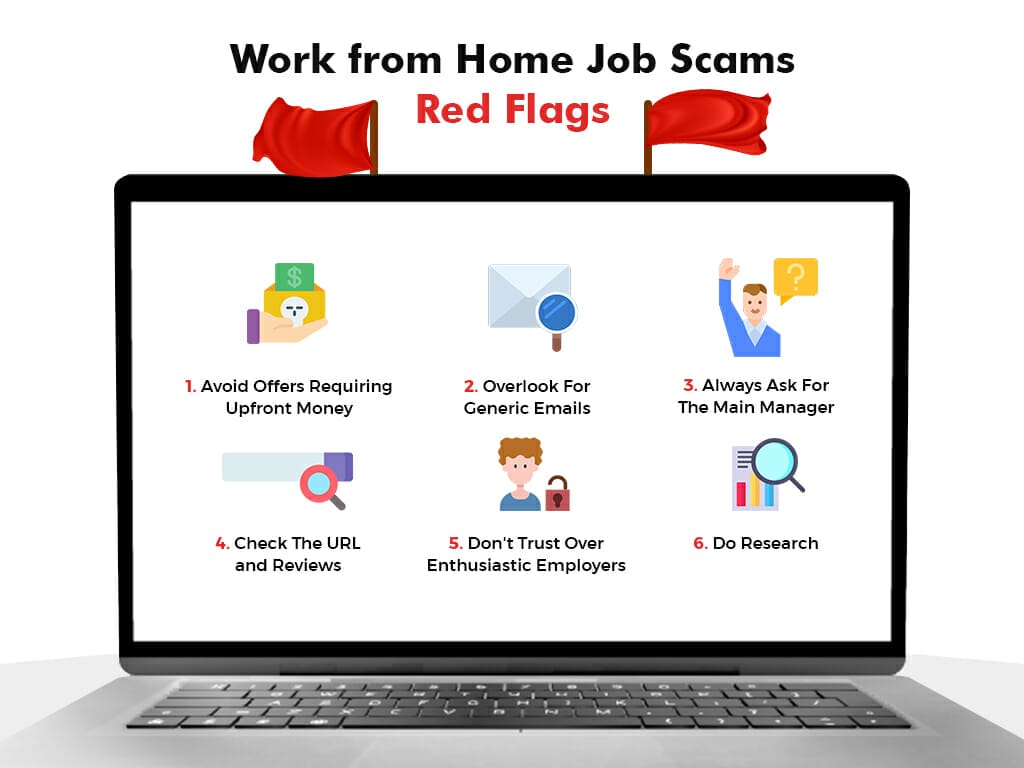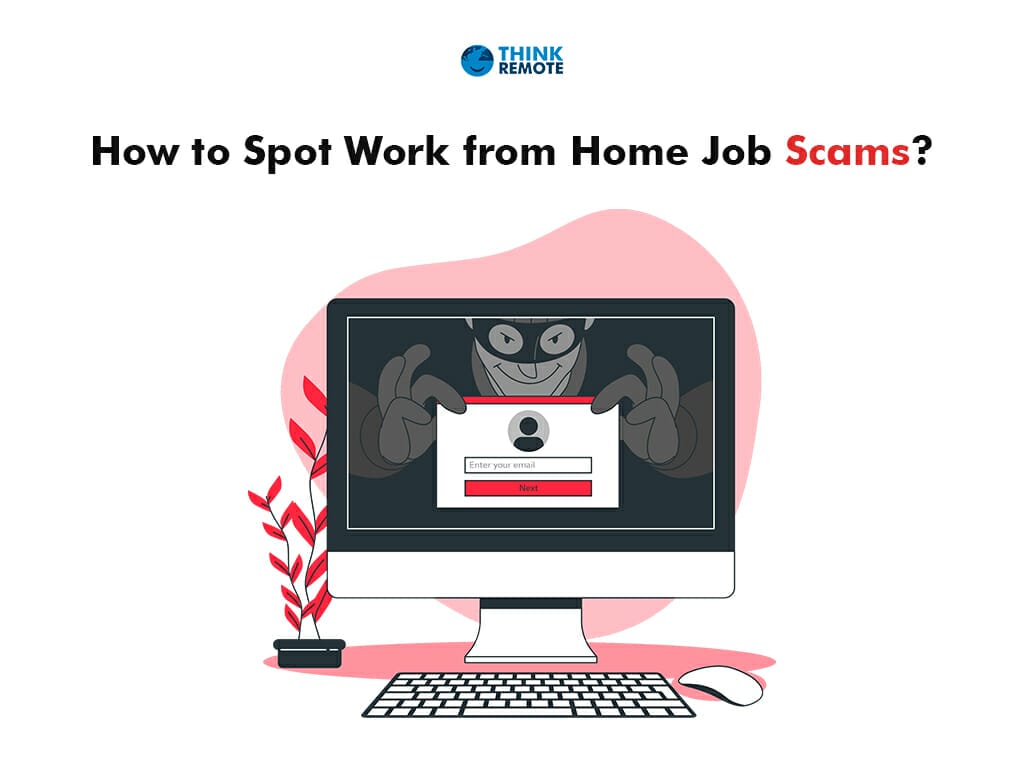In the times we found ourselves in, what seems too good to be true it’s probably a scam. Even before the remote work revolution, scams and fake deals have always been there – remember The Wolf of wall street?
As sad as it sounds, building a website nowadays is easier than ever. Before you even realize you become a victim of a job scam. And unfortunately, you are in good company.
According to the Better Business Bureau, nearly 14 million professionals have become victims of job offer scams while looking for a remote position. In the same vein, the Federal Trade Commission addressed almost 59,000 complaints about fake products and business opportunities alike.
However, we have good news. People have learned how to deal with scams in the past, and we can learn how to recognize them today.
Here is a guide to spot the most common job offer scams and protect yourself in the future!
5 Work From Home Job Scams Examples
Before delving into how to recognize job scams, let’s examine the most common fake offers that usually bait remote workers, prevalent in the ‘scam market’.
Stuffing Envelope
As we said, job scams have always existed. And some of them survived the remote work revolution. According to the National Consumers League, the envelope-stuffing scheme is one of the most common work from home scams. Since the U.S. Depression in 1930, this type of scheme has been happening in different variations.
Basically, people can earn money stuffing envelopes for a company at home. Usually, they have to pay a small fee ($15-40) to get the materials to start. They believe to send envelopes on behalf of companies. In reality, they are following instructions to make other people fall into the same trap and pay to start this fake job.
As a pyramid scheme, you will earn only if other people become victims of the scam. In this case, you can make money, but you will be prosecuted for fraud.
Chain Emails with Money
Another example of this type of pyramid scheme is chain mail. You probably came across them already. In this case, you receive an email asking to send other emails and a small amount to a list of people. In this list, your name is at the bottom. As the list rolls, your name jumps on top. After that, you will start receiving money from multiple sources. You can even become a millionaire but risk a fraud conviction.
Call 1-900
Have you heard about the infamous ‘Call 1-900′ job scams? This type of scam isn’t really a job, but it’s a risk for job seekers. To put it simply, when you call one of these numbers, you unconsciously agree to pay the phone charge of the company. Usually, one scam center faxes out public opinion surveys or opportunities for courses and training. If you call the number to answer the questionnaire or have information, the only thing you can get out of it is an expensive phone bill.
Assemble Craft
What would you do if you could earn money just assembling dolls and toys in your kitchen? Probably, you would be happy to find an easy temp job you can do at home while experimenting with some craft projects. Well, not everything that shines is gold. Indeed, these kinds of job scams offer you a pay-per-piece assembled work. Once you accept the fake offer, you make an upfront payment to get the starter kit and instructions. When you send the assembled parts back, the company will refuse your work. You won’t ever match the quality they are expecting. So, they are allowed to terminate the contract without giving you a refund.
Medical Billing
Another scam for job seekers is processing online medical claims. Usually, a sales representative contacts you to invest a small amount in starting a profitable medical billing business. They even provide a list of potential clients and technical support. Once you start working on your brand new profitable remote business, you soon realize that the list is outdated and the industry is quite competitive – after all, you could have seen this coming. Medical billing is a competitive business with experienced and established companies, and it’s implausible to make a profit with online materials.
How to Protect Yourself from Job Scams?
As we mentioned initially, the first thing to protect yourself is not to believe what is too good to be true. When it feels like a pyramid scheme or a fake offer, that’s probably what it is. Trust your gut on it. However, some people are very skilled in faking websites and opportunities. So, when your intuition isn’t enough, here are some guidelines to avoid job scams:

1. Avoid Offers Requiring Upfront Money
If a company asks you for upfront money, it’s a scam job. The only place where it is ok to pay upfront is a bar. In the era of refunds and customer service, why should an employer ask for upfront money?
2. Overlook For Generic Emails
Whether small or corporate scale, good companies have business emails. That’s the first step to be credible with clients – and future candidates. If you receive a job offer through a generic email I.D. (Yahoo, AOL, or Gmail), it’s a scam.
3. Always Ask For The Main Manager
When you can’t speak directly with managers, you have another red flag for scams. Even if you are applying for the lowest position in a company, you should still meet your managers during the hiring process. If job offers via email raise your suspicions, so should cloudily interview processes. If you face poor communication, 90% of the time is a job scam – or a really bad company to work for.
4. Check The URL and Reviews
As we mentioned, creating a website is fairly easy nowadays. You can copy logos, layout, and color palette. A mediocre developer can still create an interface that looks professional and authentic. So, always check the URL and reviews. You still find good people ready to share their experiences and avoid others falling into job scams on the Internet.
5. Don’t Trust Over Enthusiastic Employers
It might sound depressing, but it’s a scam when someone is too eager to hire you – unless you are a genius used to having multiple job offers at once. If an employer tries to sell it to you too enthusiastically, the job is either a scam or a terrible position.
6. Do Research
We all should always research the company we are applying for, even when it’s not a scam – if you don’t, start right now. If you receive a fake job offer email, the first thing to check is the descriptions and details. When details are vague, and you can’t find information about the company, it’s a scam.
Scam jobs exist, but it’s possible to recognize and avoid them. To recap, as the Federal Trade Commission quotes: “Promises of a big income working from home, especially when the opportunity involves an upfront fee or giving your credit card information, should make you very suspicious.”
How to Report Job Search Scams
When you recognize a scam job, you should report or at least leave a review for others. If you are in the U.S., you can report fraud and scams at this website: Stop Scams Fraud. According to the government official website, scammers pretend to operate as Social Security Administration.
Some of the common signs are:
- Canceling your social security benefits
- Demand for payments
- Threats of lawsuits or arrest
- Suspension of social security
- Robocalls
In this case, you can also call 1-877-382-4357 for any kind of job scams you have witnessed through phone calls, emails, fake checks, computer support scams, imposter scams, student loan scams, scholarship scams, sweepstake scams, or more.
Work From Home Jobs That Aren’t Scams
With that said, legitimate jobs from home exist – which is why most people are so enthusiastic about it. Here is a shortlist of the main jobs you can do from home:
1. Freelance Writer
2. Proofreader
3. Blogger
4. Virtual Assistant
5. SEO specialist
6. Voiceover Artist
7. Transcriptionist
8. Web Designer
9. Online Tutor
10. Customer Service Representative
11. Technical Support Representative
A good start to avoid scams is to apply through official remote work platforms like JustRemote, Remote.co, Virtual Vocations, or Working Nomad. After that, remember to research the company, ask precise questions on the position, and meet the managers. Remember that even on these platforms, some job offers could be fake. So, if you see any of the red flags we mentioned above – like poor job description, no direct contacts with managers, or generical mails and weird URLs – report the offer to the website and skip it.
Finally, remote workers and digital nomads like to be connected on Social Media. You can join groups and pages to double-check the company you’re applying for or even ask for work opportunities.
Last Thoughts
Job scams have always existed, exist now, and will exist tomorrow. We all have to make peace with it. While worldwide governments find ways to stop them, we can learn how to be smart and navigate this complex (digital) world. So, don’t give up hope, don’t trust anyone, and get ready to find the perfect work-from-home job for you!






